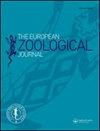季节对巴西里约热内卢州 o jo河流域环境保护区潜在媒介蚊产卵活动的影响(双翅目:库蚊科
IF 1.6
4区 生物学
Q2 ZOOLOGY
引用次数: 2
摘要
摘要大西洋森林是几种可能对人类致病的虫媒病毒的家园。因此,评估季节性对该领域传播的蚊子种群的影响至关重要。我们评估了季节变化对巴西里约热内卢环境保护区流行病重要蚊子种群产卵活动的影响。用诱蚊产卵器收集蚊子卵一年。在采样期间,共采集了1086个鸡蛋。其中39只(3.6%)没有孵化,1047只(96.4%)达到成年期。白纹伊蚊(44.8%)、地伊蚊(6.4%)和白血白鱼嗜血杆菌(48.8%)的卵和成虫已被鉴定。还分析了该群落随季节的变化。季节对藏品的影响很大。夏季和秋季采集的卵子数量最多,其中汞含量最高。白灰蝶在夏季占优势,白纹伊蚊在秋季占优势。就收集到的蚊子群落的组成而言,这两个季节更为相似,形成了一个独立于冬季和春季的群落。夏季、秋季和冬季的优势度(D)、香农多样性(H)和均匀度(J)的值比春季更接近。除温度与白纹伊蚊的存在呈正相关外,整个采集期记录的气候因素与卵子丰度无关。最后,季节性似乎影响了记录的三个物种的产卵活动。夏季和秋季是受白纹伊蚊和汞影响最严重的季节。白细胞循环。在研究区域预防和实施昆虫学控制策略时,应考虑这些发现。本文章由计算机程序翻译,如有差异,请以英文原文为准。
Effects of seasonality on the oviposition activity of potential vector mosquitoes (Diptera: Culicidae) from the São João River Basin Environmental Protection Area of the state of Rio de Janeiro, Brazil
Abstract The Atlantic Forest is home to several arboviruses potentially pathogenic to humans. Therefore, it is crucial to assess the effects of seasonality on mosquito populations circulating in this domain. We evaluated the influence of seasonal variation on the oviposition activity of epidemiologically important mosquito populations in an Environmental Protection Area in Rio de Janeiro, Brazil. Mosquito eggs were collected using ovitraps for 1 year. During the sampling period, 1,086 eggs were collected. Of these, 39 (3.6%) did not hatch, and 1,047 (96.4%) reached the adult stage. Aedes albopictus (44.8%), Ae. terrens (6.4%), and Haemagogus leucocelaenus (48.8%) eggs and adults were identified. The changes in this community over the seasons were also analyzed. Season influence on the collections was significant. The highest numbers of collected eggs were collected in the summer and autumn, with Hg. leucocelaenus dominant in the summer and Ae. albopictus in the autumn. These two seasons were more similar to each other in terms of the composition of the collected mosquito community, forming a separate cluster from winter and spring groups. Summer, autumn, and winter presented values of Dominance (D), Shannon Diversity (H), and Evenness (J) closer to each other than spring. Climatic factors recorded throughout the collection period were not associated with egg abundance, except for temperature, which was positively correlated with Ae. albopictus presence. Finally, seasonality seemed to influence the oviposition activity of the three species recorded. Summer and autumn were the most critical seasons due to Ae. albopictus and Hg. leucocelaenus circulation. These findings should be considered in prophylaxis and implementation of entomological control strategies in the study area.
求助全文
通过发布文献求助,成功后即可免费获取论文全文。
去求助
来源期刊

European Zoological Journal
Agricultural and Biological Sciences-Animal Science and Zoology
CiteScore
3.10
自引率
5.60%
发文量
80
审稿时长
30 weeks
期刊介绍:
The European Zoological Journal (previously Italian Journal of Zoology) is an open access journal devoted to the study of all aspects of basic, comparative and applied protozoan and animal biology at molecular, cellular, tissue, organ, organismal, population, and community-ecosystem level. Papers covering multiple levels of organization and integrative approaches to study animal form, function, development, ecology, evolution and systematics are welcome. First established in 1930 under the name of Il Bollettino di Zoologia, the journal now has an international focus, reflected through its global editorial board, and wide author and readership.
 求助内容:
求助内容: 应助结果提醒方式:
应助结果提醒方式:


